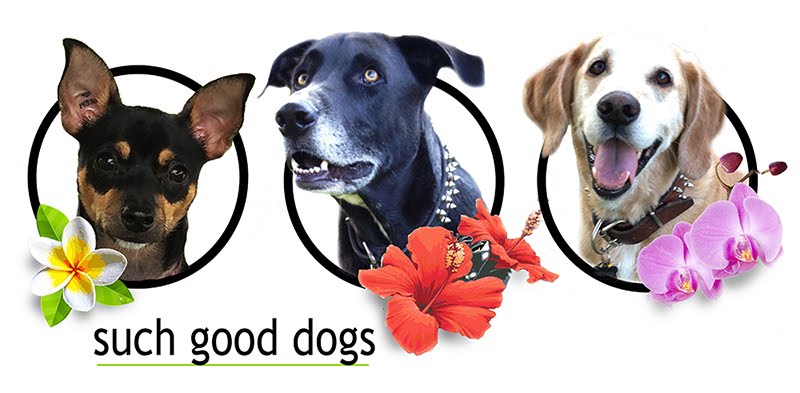General Canine Vaccinations
It is important for every dog to have a regular veterinarian and regular yearly check-ups and vaccinations. All dog will need these regular vaccinations to participate in any obedience class or before attending the dog park...
1) DHLPP
...Distemper, Hepatitis, Leptospirosis, Parainfluenze, Parvo
2) Bordatella
3) Corona
4) Rabies
Distemper is a viral disease that is highly contagious. Distemper can be fatal. Symptoms include lack of coordination, seizures, and uncontrolled twitching.
Hepatitis is a virus that is highly contagious. It is spread by contact with infected saliva, stool, or urine. Symptoms include discharge from the nose, eyes, and mouth, red eyes, and fever.
Leptospirosis is spread through contaminated urine. It is a bacterial disease that can cause kidney, liver, and digestive tract damage, and is often fatal. Symptoms include bloody diarrhea, red eyes, vomiting, abdominal pain, a brown coat on the tongue, and ulcers in the mouth.
Parainfluenza, more commonly known as "Kennel Cough," is a highly contagious viral disease, caused by several different viruses. Symptoms include a dry cough and nasal discharge.
There are two kinds of Parvo: 1) Enteric (diarrhea form), 2) Myocardial (cardiac form). Canine Parvovirus is a viral disease. Parvo attacks a dog's cells like lymph nodes, bone marrow, and the gastrointestinal lining. It can affect the heart of young puppies.
1) Enteric Parvo symptoms include appetite loss, vomiting, diarrhea, and depression. This virus must be treated quickly or it can be fatal.
2) Myocardial Parvo can cause sudden death in puppies. A puppy who does recover from Myocardial Parvo may develop heart problems that could lead to a shortened life span.
Bordatella is a non life-threatening form of Parainfluenza, however it is very dangerous to young puppies. Symptoms are a dry, hacking cough and some nasal discharge.
Corona can affect dogs of all ages. This contagious viral infection is spread by fecal and oral secretions. This disease is also very dangerous to young puppies. Symptoms include diarrhea (usually orange-yellow colored and foul smelling) and loss of appetite. This disease can be fatal.
Rabies is a virus that affects the central nervous system of a dog's brain, and is often fatal. There are two forms of rabies. Paralytic Rabies may appears as only minor changes in a dog's behavior, weakness and poor coordination, before paralysis sets in. Furious Rabies is noticed by extreme behavior changes like aggressive and attack behavior. Although we do vaccinate our dogs against Rabies, if you have ANY inclination that your dog has come in contact with a rabid animal, take them to the vet immediately!
It is important for every dog to have a regular veterinarian and regular yearly check-ups and vaccinations. All dog will need these regular vaccinations to participate in any obedience class or before attending the dog park...
1) DHLPP
...Distemper, Hepatitis, Leptospirosis, Parainfluenze, Parvo
2) Bordatella
3) Corona
4) Rabies
Distemper is a viral disease that is highly contagious. Distemper can be fatal. Symptoms include lack of coordination, seizures, and uncontrolled twitching.
Hepatitis is a virus that is highly contagious. It is spread by contact with infected saliva, stool, or urine. Symptoms include discharge from the nose, eyes, and mouth, red eyes, and fever.
Leptospirosis is spread through contaminated urine. It is a bacterial disease that can cause kidney, liver, and digestive tract damage, and is often fatal. Symptoms include bloody diarrhea, red eyes, vomiting, abdominal pain, a brown coat on the tongue, and ulcers in the mouth.
Parainfluenza, more commonly known as "Kennel Cough," is a highly contagious viral disease, caused by several different viruses. Symptoms include a dry cough and nasal discharge.
There are two kinds of Parvo: 1) Enteric (diarrhea form), 2) Myocardial (cardiac form). Canine Parvovirus is a viral disease. Parvo attacks a dog's cells like lymph nodes, bone marrow, and the gastrointestinal lining. It can affect the heart of young puppies.
1) Enteric Parvo symptoms include appetite loss, vomiting, diarrhea, and depression. This virus must be treated quickly or it can be fatal.
2) Myocardial Parvo can cause sudden death in puppies. A puppy who does recover from Myocardial Parvo may develop heart problems that could lead to a shortened life span.
Bordatella is a non life-threatening form of Parainfluenza, however it is very dangerous to young puppies. Symptoms are a dry, hacking cough and some nasal discharge.
Corona can affect dogs of all ages. This contagious viral infection is spread by fecal and oral secretions. This disease is also very dangerous to young puppies. Symptoms include diarrhea (usually orange-yellow colored and foul smelling) and loss of appetite. This disease can be fatal.
Rabies is a virus that affects the central nervous system of a dog's brain, and is often fatal. There are two forms of rabies. Paralytic Rabies may appears as only minor changes in a dog's behavior, weakness and poor coordination, before paralysis sets in. Furious Rabies is noticed by extreme behavior changes like aggressive and attack behavior. Although we do vaccinate our dogs against Rabies, if you have ANY inclination that your dog has come in contact with a rabid animal, take them to the vet immediately!




